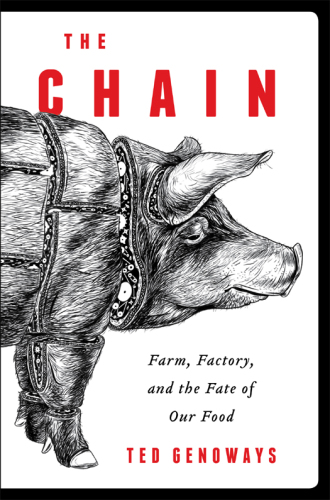
The Chain
Farm, Factory, and the Fate of Our Food
کتاب های مرتبط
- اطلاعات
- نقد و بررسی
- دیدگاه کاربران
نقد و بررسی

September 1, 2014
In this cautionary tale of a leading meat producer, the former editor of the Virginia Quarterly Review and contributing editor of Mother Jones delves into the inner workings of Hormel Foods, a company struggling to meet America’s insatiable hunger for hog products while keeping prices down. Hormel, with major plants in the nation’s heartland, keeps its conveyor belts operating full speed, processing all edible parts of the hog, including severed hog heads, sliced ears, clipped snouts, sliced cheek meat, and cut-out tongues. While hams, sausages, and Spam are processed at breakneck speed, Genoways discovered that the meatpacking giant often put profits over people, interviewing former and current workers, with fingers lost to saws or disabled by unrelenting illnesses. A medical team found plant workers wear little protective gear, which leaves them exposed to the inhalation of illness-causing aerosolized brain matter, but when sick employees filed for disability, they were rejected. Residents of town near Hormel plants also feel threatened by the company’s workers (largely illegal), as well as by water and soil contamination in small towns from plant runoff. Comparable to Sinclair’s classic expose, The Jungle, Genoways’s blistering account of the meatpacking industry makes the case for tighter monitoring of this powerful sector of American agribusiness.

October 1, 2014
From the farms where livestock is raised to the packing plant where meat is processed for human consumption to the grocery aisles and eventually our tables, the American meatpacking industry is a complex and massive system. Using the example of Hormel Foods and Quality Pork Processors, investigative journalist Genoways (Mother Jones) provides readers with an exhaustive examination of this industry, shedding light on how it has evolved and expanded to embrace change, demand, and innovation. Accessibly written chapters are broken down by subject, and content is sometimes reiterated for a fuller picture. Topics include the history of Hormel and labor unions, the potential socioeconomic and health effects of working on the meatpacking floor, animal rights and the economic risks farmers face raising hogs for slaughter, local resistance to immigrant labor in the industry, government regulation and inspections, disease outbreak concerns, and more. Helpful notes and some small photos are included. VERDICT Readers curious about meatpacking and agriculture as well as the social, economic, and environmental impacts of the food industry will find Genoways's nonfiction debut a valuable and stimulating read.--Jennifer Harris, Southern New Hampshire Univ. Lib., Manchester
Copyright 2014 Library Journal, LLC Used with permission.

























دیدگاه کاربران